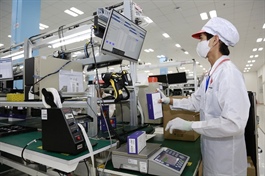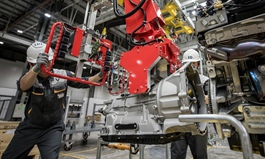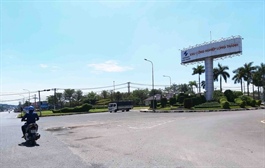Opportunities and challenges for Vietnamese SMEs under EVFTA
Opportunities and challenges for Vietnamese SMEs under EVFTA
Vietnamese small- and medium-sized enterprises (SMEs) are urged to deal with their existing limitations to grasp the opportunities arising from the EU-Vietnam Free Trade Agreement (EVFTA).
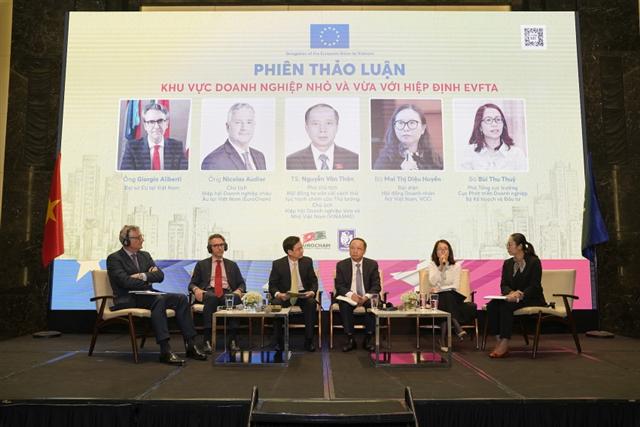
The participants discussed about the opportunities and challenges for Vietnamese SMEs under the EVFTA
|
The Delegation of the European Union to Vietnam (EUD), in accordance with the Vietnam Association of Small- and Medium-sized Enterprises (VINASME) and the European Chamber of Commerce in Vietnam (EuroCham), held a roundtable on March 26 to discuss opportunities and challenges presented by the EVFTA.
Titled “Small and medium enterprises and the EU-Vietnam FTA”, the seminar attracted more than 100 delegates from ministries, government agencies, EU member states, business associations, and especially more than 50 SMEs in Vietnam.
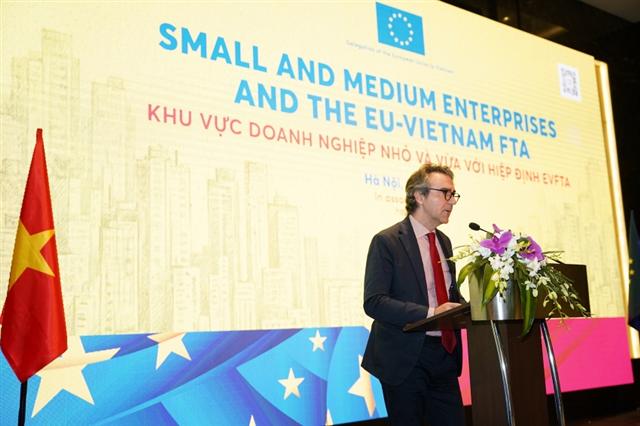
Giorgio Aliberti, EU Ambassador to Vietnam
|
Opening the seminar, Giorgio Aliberti, EU Ambassador to Vietnam, highlighted that it is important to have mechanisms as tools to strengthen the SMEs. The EU believes that it is a wise strategy for it to support and invest in a country like Vietnam. The EVFTA should give more opportunities to SMEs, and SMEs should use this tool most effectively. The EU hopes this agreement will improve the business environment for both European and Vietnamese businesses.
Addressing the event, Tran Duy Dong, Deputy Minister of Planning and Investment, said that, “Vietnamese enterprises are still facing difficulties in participating in global and regional value tax due to their limited competitiveness in processing.”
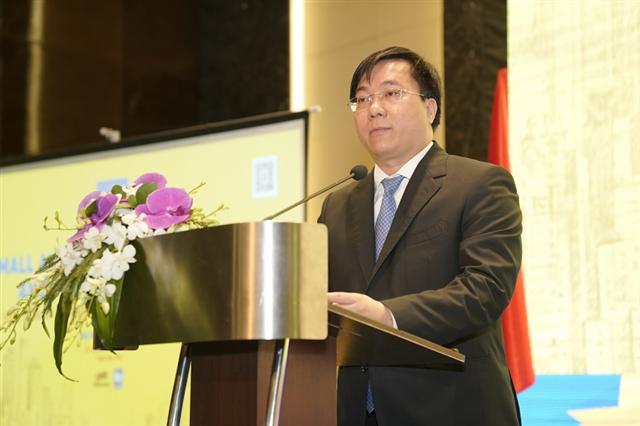
Tran Duy Dong, Deputy Minister of Planning and Investment
|
Dong added that there are three main reasons: Firstly, enterprises are still small and have problems in mobilising resources, have no long-term investment strategy, and do not dare to risk investment in development. Secondly, Vietnamese businesses still rarely form long-term partnerships towards general development goals. Thirdly, SMEs' visions are short-term and regional linkages are fragmented, reducing export efficiency. This is a problem the government is always concerned about: strengthening and promoting links between large enterprises and domestic private enterprises. With the challenges and opportunities that the EVFTA brings, the government and the Ministry of Planning and Investment (MPI) have specific plans to support Vietnamese businesses.
In the last three decades, the SME sector in Vietnam has grown exponentially and has been a key contributor to Vietnam’s economic growth in recent years. The rise in the number of SMEs has resulted in dramatic growth in private enterprises' capital stock. SMEs in Vietnam also have contributed significantly to exports which were estimated at $246.2 billion in 2019 and the imports of goods at $253 billion in 2019. The internationalisation of Vietnamese SMEs, most notably through international trade and linkages with global supply chains, are supported by international trade agreements, which Vietnam has adhered to.
In this context, a roundtable was organised to increase understanding among Vietnamese enterprises, business associations, and policymakers about the EVFTA and its contribution to Vietnam's SME sector. The seminar had in-depth discussions on SMEs' current growth, opportunities, and challenges, the contributions of the EVFTA, and sustainable development ways to promote SMEs. Especially during the session, SMEs' opportunities and challenges under the EVFTA are analysed from multi-dimensional perspectives of the government, EUD, VINASME, VCCI, and EuroCham.
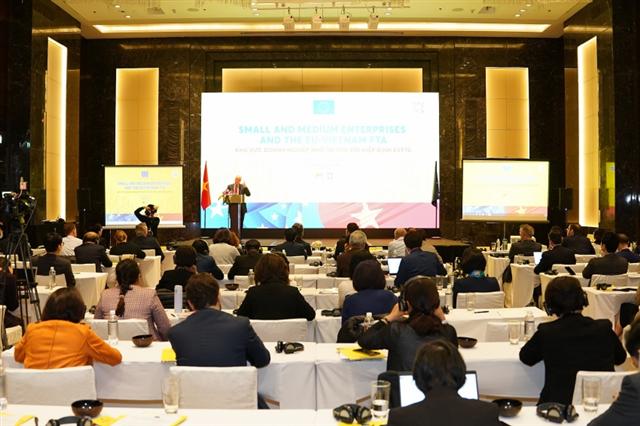
The rountable
|
Nguyen Minh Thao, director general of Business Environment and Competitiveness at the Central Institute of Economic Management, shared that SMEs account for nearly 98 per cent of the country's enterprises and contribute 40 per cent of the national GDP.
With the significant contributions of enterprises, SMEs now have more opportunities to develop with the participation of Free Trade Agreements or the Fourth Industrial Revolution and the emergence of new business models. However, most enterprises are mainly micro- and small-sized, leading to extremely low business efficiency and labour productivity.
On the topic of SMEs and sustainable development, Stephan Ulrich, Vietnam programme manager of the International Labour Organization (ILO), gave a brief presentation on SMEs' challenges to comply with labour standards and ways to improve compliance in SMEs. He points out some key issues labourers face, such as work safety, overtime limits, contracts and social security, worker grievances and consultation. And to strengthen labour inspection, expanding social security without burdening SMEs, awareness-raising through SME organisations, and SME support programmes are expected as the ways forward for achieving labour compliance and improving quality for SMEs.
This is the last in a series of three roundtable events organised by the Delegation under the EU-Vietnam Partnership Facility (EVPF) framework. Through the three roundtable events, outstanding topics such as the EVFTA and Vietnam’s integration into global value chains in the world after COVID-19, digital economy and digital transformation, SMEs, and the EVFTA have been discussed comprehensively in all aspects.







